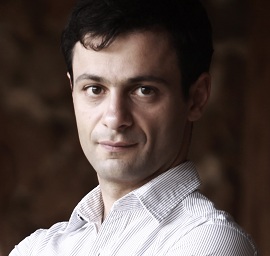 Dr Artem Oganov
Dr Artem Oganov
December 19, 2013
11.30 – 13.00
Beijing-1 Auditorium, China cluster (Skolkovo School of Management)
SEMINAR ABSTRACT:
Thanks to powerful evolutionary algorithms, in particular to the USPEX method [1-3], it is now possible to predict both the stable compounds and their crystal structures at arbitrary P,T-conditions, given just the set of chemical elements. Some of the results that I will discuss include:
1. Theoretical and experimental evidence for a new stable high-pressure phase of boron, γ-B [4], showing unique properties and chemical bonding.
2. New insulating and optically transparent form of sodium, predicted by theory and confirmed by experiment [5].
3. Establishment of the structure of a carbon allotrope – M-carbon [1,6].
4. Predicted reactivity of noble gases under moderate pressures – Xe [7] and even He.
5. Predicted stability and experimental confirmation of “impossible” chemical compounds – such as Na3Cl, Na2Cl, Na3Cl2, NaCl3, NaCl7 [8], as well as Mg3O2 and MgO2 [9].
SPEAKER INTRODUCTION:
Artem R Oganov was born in 1975 in Moscow, Russia. In 1997 he graduated from Moscow State University with summa cum laude in Crystallography. In 2002 he got a PhD in Crystallography at University College London. After a brief postdoc there, in 2003 he moved to ETH Zürich as a group leader, where in 2007 he obtained a Habilitation degree. In 2008 he moved to SUNY Stony Brook as Associate Professor, and in 2010 he was promoted to Full Professor. In 2011 Russian Forbes ranked Oganov among the 10 most successful Russian-born scientists today. In 2013 Oganov simultaneously obtained megagrants from Russian and Chinese governments and created laboratories in Russia and China.
Oganov has authored 120 papers and book chapters, and 2 patent applications. Many of his papers were published in top-impact journals, including 5 in Nature, 1 in Science, 1 in Nature Materials, 1 in Nature Chemistry, 5 in Proc. US Natl. Acad. Sci., 8 in Physical Review Letters, 1 in Accounts of Chemical Research, 2 in Scientific Reports, etc.). His total citation is 4040, with h-index 33. He attracted grants for over $15 million, both public and private. Oganov won many awards, including University Latsis Prize, medal of the European Mineralogical Union, three awards for the most cited paper by Elsevier. He held >10 invited professorships in Italy, France, Hong Kong, China, and in 2012 became an Honorary Professor of Yanshan University (China).
His most important works are in the fields of computational materials discovery, study of matter at high pressures, and development of novel computational methodologies for predicting the structure and properties of materials. The unique evolutionary method for crystal structure prediction, developed by Oganov, is currently used by over 1500 researchers worldwide. This method allows prediction of novel materials, both organic and inorganic, with desired properties, and has produced many breakthroughs, both in fundamental and applied research.